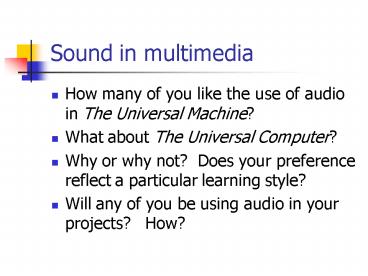Sound in multimedia PowerPoint PPT Presentation
Title: Sound in multimedia
1
Sound in multimedia
- How many of you like the use of audio in The
Universal Machine? - What about The Universal Computer?
- Why or why not? Does your preference reflect a
particular learning style? - Will any of you be using audio in your projects?
How?
2
Measuring sound
- Sound is measured in decibels (db), the pressure
or volume - typical voice conversation is 70db,
- a soft whisper is 30db,
- a jackhammer is 120db
- Decibels measure the energy required to make
sounds logarithmically - A jackhammers noise is about 1 watt, but voice
conversation is 1/100,000 watt
3
MIDI
- A notation similar to a musical score
- A communications standard describing how
electronic instruments and synthesizers play
musical sound - Advantages
- Often smaller than digital wave form files
- Can be stretched or edited more easily
- Exploits quality of good playback instruments
- Disadvantages
- Playback not reliable, depends on instruments
- Cant play speech
4
Digital audio
- Windows uses WAV format, Apple uses AIFF
- Advantages
- Reliable playback (what you hear is what you
get) - Required for speech playback
- Sound effects in \windows\media or the web
- Are any of you planning to use simple digitized
sound effects in your projects? - How so? Where are you getting your sound
effects?
5
Digitized sound is sampled
Sampling frequency/rate how often the
sound sample is taken Sampling size how
much information is stored per sample
6
Quantization
- More sampling and more data improves quality and
resolution - Value of each sample is rounded off to nearest
integer (hence, quantization) - 8-bit sampling size provides 256 bits to describe
dynamic range of amplitude - 16-bit sampling size provides over 65 thousand
bits for dynamic range, but significantly
increases space requirements
7
Clipping
- Occurs if amplitude exceeds intervals
- Clipping produces hiss or other distortions
8
Computing the size of a digital recording
- Sampling rate duration (seconds) (bit
resolution / 8) 1 (mono) or 2 (stereo) - E.g., for a 10 second recording at 20.05 kHz,
8-bit resolution, monophonic (good for speech) - 22050 kilohertz 10 seconds 8/8 1 220,500
bytes - Or, for 10 seconds of good music quality at 44.1
kHz, 16-bit resolution, stereo - 44100 kHz 10 16/8 2 1,764,000 bytes
- Red Book standard (ISO 10149) for CD-quality
audio - Expensive for multimedia
- Playing 16-bit resolution requires 16-bit sound
cards
9
Compression of digital audio
- Compression algorithms can reduce file size by
about an order of magnitude - Downside? More clipping, sound degradation
- Authorware Shockwave Audio (SWA)
- Xtras-Other-Convert WAV to SWA
- Also Voxware (better for speech)
- Flash on import, converts wav to 128kb mp3
- Stored automatically as symbols in library
- Select imported sound from frame properties
- Why might it be better to convert some wav files
to mp3 outside of Flash?
10
Compression of digital audio
- Compression algorithms can reduce file size by
about an order of magnitude - Downside? More clipping, sound degradation
- Authorware Shockwave Audio (SWA)
- Xtras-Other-Convert WAV to SWA
- Also Voxware (better for speech)
- Flash on import, converts wav to 128kb mp3
- Why might it be better to convert some wav files
to mp3 outside of Flash?
11
Importing sound into Flash
Converts tada.wav to mp3 internally
12
Flash stores sound as symbols
- Click on frame, go to Properties inspector, then
select Sound from list
13
Controlling sounds in Flash
- Effect options
Sync options
Event synchronizes the sound to an event, such
as a button click Start same as event, except
it wont start new instance of new sound Stop
silences this sound (also see action
StopAllSounds) Stream keeps sound in sync with
animation on a web site sound wont play longer
than the number of frames it occupies
14
Tips for recording sound
- Use a decent quality microphone
- Should eliminate noise when silent
- Choose narrators who speak clearly
- Coach your narrator for pronunciation, emphasis
- A sound editor lets you manipulate sound
- Trimming removing white or empty space
- Splicing combining parts of several sounds
- Amplifying adjusting volume (for consistency)
- Re-sampling (e.g., from 16-bit down to 8-bit)
- Conversion and compression (e.g., wav to mp3)

